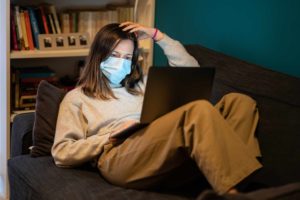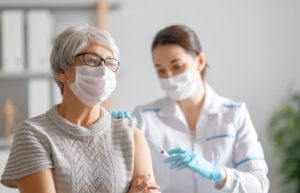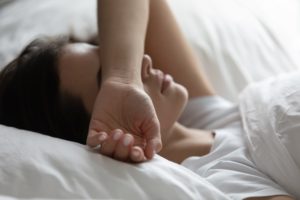Can COVID-19 Cause Insomnia and Sleep Problems?
- Around 52% of people with COVID-19 experienced sleep problems.
- Coronasomnia can apply to insomnia caused by COVID-19 infection or by any pandemic-related reason.
- Sleep difficulties, like insomnia, are common symptoms of “long COVID”.
- Speak to your doctor if you experience persistent sleep issues, shortness of breath, or changes to your mental health.
Even years after the declaration of a global pandemic in March 2020, studies continue to document the effects of COVID-19, the disease caused by the SARS-CoV-2 coronavirus. A growing body of evidence demonstrates that COVID-19 can cause both short- and long-term sleep problems.
As many as 40% of people report having difficulties sleeping during the pandemic, and it is estimated that around 36% of people had symptoms of insomnia during the first wave of COVID-19. Sleep problems are also emerging as a long-term issue as up to 31% of people with long COVID experience disrupted sleep.
As this data indicates, insufficient sleep is an important aspect of COVID-19’s health effects. The impact is made even more serious by the fact that sleep is fundamental not only for general health but also for a well-functioning immune system.
Recognizing the consequences of COVID-19 on sleep can improve understanding of this disease. It can also enable steps to get better sleep despite the challenges posed by the pandemic.
Looking to improve your sleep? Try upgrading your mattress.
Are Sleep Problems a Symptom of COVID-19?
Although sleep problems are not frequently listed among the key symptoms, an analysis across countries found that around 52% of people with COVID-19 have sleep disruptions.
COVID-19 can cause diverse symptoms among different individuals. Some of the frequent symptoms of COVID-19 include:
- Fever
- Cough or other difficulty breathing
- Runny or stuffy nose
- Sore throat
- Headaches or body pain
- Loss of smell or taste
- Fatigue
- Digestive problems like nausea or diarrhea
COVID-19 vaccines are proven to reduce the risk of severe disease, but getting COVID can still cause noticeable physical symptoms, many of which can interfere with sleep. For example, having a cough or difficulty breathing may make it harder to get solid rest.
Studies have found that these sleep disruptions affect both hospitalized and non-hospitalized people with COVID-19. Use of certain medications to treat symptoms can also contribute to sleep disruptions.
Poor sleep may also slow the body’s recovery from a coronavirus infection. Sleep is believed to play a vital role in immune responses and the body’s broader processes of recuperation and repair.

What Is Coronasomnia?
Coronasomnia, a combination of the words coronavirus and insomnia, is a term used to describe the broad scope of sleep problems related to the COVID-19 pandemic.
Coronasomnia, sometimes called COVID-somnia, is a colloquial rather than an official or medical term. It reflects the fact that sleep problems during the pandemic occur for many reasons beyond just an infection with the SARS-CoV-2 coronavirus.
Research has found notable changes in sleep patterns, including altered bedtimes, difficulty falling asleep, and reduced sleep quality. Not surprisingly, these sleep disruptions have also been linked to daytime sleepiness during the pandemic.
Coronasomnia encompasses multiple ways that the COVID-19 pandemic can interfere with sleep. These factors can overlap and have dynamic effects on sleep for different people.
- Disrupted routines: Pandemic-driven restrictions on activities, along with plans that are constantly changing because of virus exposures, can make it hard to maintain normal routines. This can throw off daily schedules and the body’s internal clock or circadian rhythm, creating a higher risk of sleep disruptions.
- Isolation: For many people, the pandemic has involved greater degrees of social isolation that can negatively impact emotional health and sleep.
- Stress: Worries about personal health, family, work, and finances are examples of how the pandemic has increased stress. While everyone responds to stress differently, for many people it can trigger sleep problems, including insomnia. People with the highest levels of stress may be most likely to struggle with sleep.
- Pandemic fatigue: One consequence of the long-running waves of infections and virus variants is pandemic fatigue, which has been associated with poor sleep. This may be exacerbated by a steady stream of negative headlines that are particularly harmful to the sleep of people who carefully follow the news.
- Caregiving roles: Attending to children who are kept home from school or taking care of a loved one who has COVID-19 can require significant time and energy that may weigh on a person’s sleep.
- Altered dreams: Studies show that people are having more dreams and nightmares during the pandemic. Nightmares can cause nighttime awakenings, to the detriment of sleep quality.
- Mental health challenges: Early in the pandemic, researchers in China observed higher levels of anxiety and depression, which are linked to insomnia and sleep problems. Subsequent studies have shown increased levels in other countries as well.
- Undiagnosed sleep disorders: The pandemic has limited access to health care facilities, including the sleep labs that are important for diagnosing sleep disorders like obstructive sleep apnea (OSA). As a result, some people may have gone without important treatments such as CPAP therapy.
- Reduced medical care: Because many people have avoided seeking non-urgent medical care during the pandemic, their pain and other sleep-disturbing symptoms may remain untreated.
Who Is Most Susceptible to Coronasomnia?
COVID-related sleep problems can happen to virtually anyone, but some people have been found to have a higher risk of disrupted sleep.
- People with COVID-19: People who get COVID-19 have been identified in multiple studies as the most likely to have sleep disturbances.
- Health care workers: The strain and stress of everyday work during the pandemic has led to widespread sleep problems among health care workers. Studies from early in the pandemic found that over 70% of medical workers had significant sleep problems. Later research found sleep problems affecting over 30% of health care workers.
- Children: Nearly half of all children have had sleep difficulties during the pandemic. Shifting school routines, reduced time for play and social interaction, and more screen time are among the possible causes.
Long-Term Sleep Effects Post-COVID-19
Unfortunately, sleep difficulties related to COVID-19 can be long-lasting. Sleep problems are among the most common symptoms of “long COVID”. One analysis of multiple studies found 31% of people with long COVID have trouble sleeping.
While there is no universal definition of long COVID, the term generally describes symptoms that arise or persist one to three months after a COVID-19 infection. Individuals with long COVID are sometimes called COVID “long haulers”.
People who have severe cases of COVID-19 have a higher chance of lasting symptoms, but long COVID can also affect people who have mild cases. Hallmark symptoms of long COVID include fatigue, shortness of breath, aches and pains, difficulty thinking, and poor sleep.
Sleep problems occur in people who are hospitalized with severe COVID, as well as in people whose symptoms do not require hospitalization. In one large study, sleep difficulties were actually more common in people who were never hospitalized.
A COVID-19 infection can cause long-term sleep problems in several ways.
- Development of chronic insomnia: Sometimes insomnia is an acute problem that lasts only a few days or weeks. However, if not addressed, it can become a chronic and lasting problem, which can occur in people whose sleep is affected by COVID-19.
- Mental health problems: COVID-related sleeping problems can alter a person’s mood and mental health, heightening their risk of ongoing sleep disruptions.
- Changes to sleep architecture: People who have had COVID-19 may spend less time in deep sleep, causing the mind and body to be less refreshed.
- Circadian rhythm disruption: Circadian rhythms are 24-hour internal clocks that regulate sleep, wakefulness, and other bodily functions. Some research has found that COVID long haulers struggle to fall asleep when they want to, which is consistent with a delayed circadian rhythm.
- Impact of other symptoms: Pain and shortness of breath can interfere with sleep during an active COVID-19 infection. These symptoms can persist in people with long COVID.
There is much that remains unknown about long COVID. But researchers are working to better understand its causes and find treatments to reduce its symptoms.
What to Do if You Can’t Sleep After COVID-19
It can take time to recover from COVID-19, and it is common to experience sleep difficulties. Taking steps to improve sleep may prevent these problems from becoming worse over time. Sleeping better may also bolster the immune system to better fight infections.
Various strategies can support better sleep. However, not every tip works for every person, so it may be necessary to try out different approaches to find what is most effective.
- Keep a sleep diary: A sleep diary is a way of tracking information about sleep timing, sleep quality, and the different factors that influence nightly rest. Using a sleep diary can help a person optimize sleep, as well as collect helpful information for a doctor, if needed.
- Reestablish routines: COVID-19 has upended many day-to-day routines that govern sleep, work, and social life. Putting new routines in place can help fill the day with cues to promote a stable sleep-wake schedule and make it easier to fall asleep at bedtime.
- Plan for better sleep: It is important to set aside enough time each night for sufficient sleep. It may help to keep a regular sleep schedule without varying bedtime or wake-up times on weekends or non-work days.
- Prioritize natural light: One of the key drivers of a healthy circadian rhythm is exposure to natural light during the day. Getting 30 minutes or more of daylight, ideally in the morning, can promote healthier sleep at night.
- Stay physically active: Daily exercise is linked to better sleep. A small study found that regular physical activity may improve mental health in the face of stress from the pandemic.
- Find ways to unwind: Relaxing before bedtime can make it easier to fall asleep quickly. This could involve meditating, doing light stretching, or getting negative thoughts out of your mind by writing them down in a journal.
- Cut back on caffeine: Caffeine can have lasting stimulant effects that interfere with sleep, so it may be best to avoid caffeine in the afternoon and evening.
- Minimize evening alcohol consumption: Having one or more alcoholic beverages at night can cause sleepiness, but drinking alcohol also reduces sleep quality.
- Create a healthy sleep setting: The bedroom should be a place to relax, feel cozy, and fall asleep easily. This typically means reducing excess noise and light, using a quality mattress and pillow, and setting the thermostat to a pleasant temperature.
- Consult with a doctor: Although improvements to sleep habits can facilitate better sleep, many sleep problems are best resolved by working with a health professional. A doctor or sleep specialist can review symptoms and order appropriate tests to gain a fuller understanding of what is causing poor sleep.
Does COVID-19 Interact With Melatonin?
To date, much remains unclear about the relationship between melatonin and COVID-19. Melatonin supplements are not part of standard treatment for COVID-19, and anyone considering taking melatonin should first consult with their doctor.
Melatonin is a hormone that is naturally created by the body. It is normally produced in response to darkness and helps establish a healthy sleep-wake rhythm. Dietary supplements usually contain a synthetic form of melatonin.
Because melatonin plays a part in the body’s immune system and inflammatory responses, some researchers propose that it may eventually have a role in treating COVID-19. Early-stage research has found that adding melatonin to other treatments may improve sleep quality in people hospitalized with COVID-19. In addition, some evidence suggests that melatonin may reduce the severity of the disease.
Overall, research remains limited. Ongoing and future research studies may offer more clarity on the potential benefits of melatonin in people with COVID-19.
Melatonin supplements can have side effects or cause allergic reactions, and some dietary supplements may not contain what is listed on the label. For these reasons, it is best to talk with a doctor before beginning to take melatonin for any health condition.
When To Talk To Your Doctor
One way to be proactive about your health is to get the advice of a doctor about continuing problems related to sleep and COVID-19. You may consider scheduling a consultation with a health professional if you have issues such as:
- Persistent symptoms of COVID-19
- Regular and ongoing difficulties falling asleep or staying asleep
- Significant daytime sleepiness that interferes with your personal or professional life
- Episodes of waking up at night and feeling short of breath
- Loud snoring punctuated by gasping or choking sounds that are observed by a bed partner
- Elevated levels of emotional stress, anxiety, depression, or other changes to your mood and mental health
A doctor can help coordinate your care, including any referrals for testing or to specialists. If you are found to have a sleep disorder like insomnia, they can recommend treatment that may bring relief. They can also offer a timeline for following up with you to see if your symptoms improve.

Still have questions? Ask our community!
Join our Sleep Care Community — a trusted hub of sleep health professionals, product specialists, and people just like you. Whether you need expert sleep advice for your insomnia or you’re searching for the perfect mattress, we’ve got you covered. Get personalized guidance from the experts who know sleep best.
References
14 Sources
-
Morin, C. M., & Carrier, J. (2021). The acute effects of the COVID-19 pandemic on insomnia and psychological symptoms. Sleep Medicine, 77, 346–347.
https://pubmed.ncbi.nlm.nih.gov/32595107/ -
Premraj, L., Kannapadi, N. V., Briggs, J., Seal, S. M., Battaglini, D., Fanning, J., Suen, J., Robba, C., Fraser, J., & Cho, S. M. (2022). Mid and long-term neurological and neuropsychiatric manifestations of post-COVID-19 syndrome: A meta-analysis. Journal of the Neurological Sciences, 434, 120162.
https://pubmed.ncbi.nlm.nih.gov/35121209/ -
Donzella, S. M., Kohler, L. N., Crane, T. E., Jacobs, E. T., Ernst, K. C., Bell, M. L., Catalfamo, C. J., Begay, R., Pogreba-Brown, K., & Farland, L. V. (2022). COVID-19 infection, the COVID-19 pandemic, and changes in sleep. Frontiers in Public Health, 9, 795320.
https://pubmed.ncbi.nlm.nih.gov/35174134/ -
Koban, K., Neureiter, A., Stevic, A., & Matthes, J. (2022). The COVID-19 infodemic at your fingertips. Reciprocal relationships between COVID-19 information FOMO, bedtime smartphone news engagement, and daytime tiredness over time. Computers in Human Behavior, 130, 107175.
https://pubmed.ncbi.nlm.nih.gov/35035063/ -
Scarpelli, S., Nadorff, M. R., Bjorvatn, B., Chung, F., Dauvilliers, Y., Espie, C. A., Inoue, Y., Matsui, K., Merikanto, I., Morin, C. M., Penzel, T., Sieminski, M., Fang, H., Macêdo, T., Mota-Rolim, S. A., Leger, D., Plazzi, G., Chan, N. Y., Partinen, M.,… De Gennaro, L. (2022). Nightmares in people with COVID-19: Did coronavirus infect our dreams? Nature and Science of Sleep, 14, 93–108.
https://pubmed.ncbi.nlm.nih.gov/35115852/ -
COVID-19 Mental Disorders Collaborators (2021). Global prevalence and burden of depressive and anxiety disorders in 204 countries and territories in 2020 due to the COVID-19 pandemic. Lancet, 398(10312), 1700–1712.
https://pubmed.ncbi.nlm.nih.gov/34634250/ -
Pataka, A., Kotoulas, S., Sakka, E., Katsaounou, P., & Pappa, S. (2021). Sleep dysfunction in COVID-19 patients: Prevalence, risk factors, mechanisms, and management. Journal of Personalized Medicine, 11(11), 1203.
https://pubmed.ncbi.nlm.nih.gov/34834555/ -
Diaz, F., Cornelius, T., Bramley, S., Venner, H., Shaw, K., Dong, M., Pham, P., McMurry, C. L., Cannone, D. E., Sullivan, A. M., Lee, S., Schwartz, J. E., Shechter, A., & Abdalla, M. (2022). The association between sleep and psychological distress among New York City healthcare workers during the COVID-19 pandemic. Journal of Affective Disorders, 298(Pt A), 618–624.
https://pubmed.ncbi.nlm.nih.gov/34695497/ -
Alimoradi, Z., Broström, A., Tsang, H. W. H., Griffiths, M. D., Haghayegh, S., Ohayon, M. M., Lin, C. Y., & Pakpour, A. H. (2021). Sleep problems during COVID-19 pandemic and its association to psychological distress: A systematic review and meta-analysis. EClinicalMedicine, 36, 100916.
https://pubmed.ncbi.nlm.nih.gov/34131640/ -
Goldstein, C. A., Kagan, D., Rizvydeen, M., Warshaw, S., Troost, J. P., & Burgess, H. J. (2022). The possibility of circadian rhythm disruption in long COVID. Brain, Behavior, & Immunity – Health, 23, 100476.
https://pubmed.ncbi.nlm.nih.gov/35663839/ -
Antunes, R., & Frontini, R. (2021). Physical activity and mental health in COVID-19 times: An editorial. Sleep Medicine, 77, 295–296.
https://pubmed.ncbi.nlm.nih.gov/33109448/ -
Ragnoli, B., Pochetti, P., Pignatti, P., Barbieri, M., Mondini, L., Ruggero, L., Trotta, L., Montuschi, P., & Malerba, M. (2022). Sleep deprivation, immune suppression and SARS-CoV-2 infection. International Journal of Environmental Research and Public Health, 19(2), 904.
https://pubmed.ncbi.nlm.nih.gov/35055726/ -
Mousavi, S. A., Heydari, K., Mehravaran, H., Saeedi, M., Alizadeh-Navaei, R., Hedayatizadeh-Omran, A., & Shamshirian, A. (2022). Melatonin effects on sleep quality and outcomes of COVID-19 patients: An open-label, randomized, controlled trial. Journal of Medical Virology, 94(1), 263–271.
https://pubmed.ncbi.nlm.nih.gov/34460132/ -
Lan, S. H., Lee, H. Z., Chao, C. M., Chang, S. P., Lu, L. C., & Lai, C. C. (2022). Efficacy of melatonin in the treatment of patients with COVID-19: A systematic review and meta-analysis of randomized controlled trials. Journal of Medical Virology, 94(5), 2102–2107.
https://pubmed.ncbi.nlm.nih.gov/35032042/






